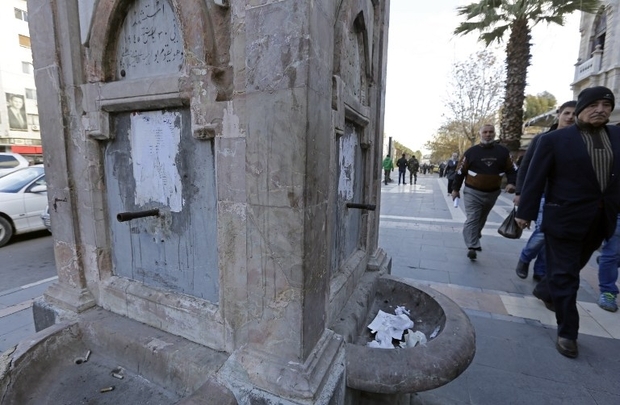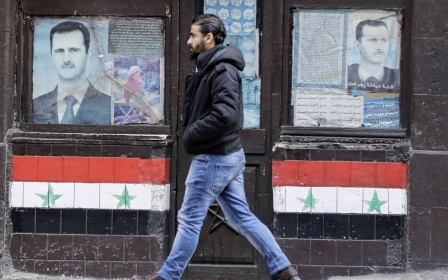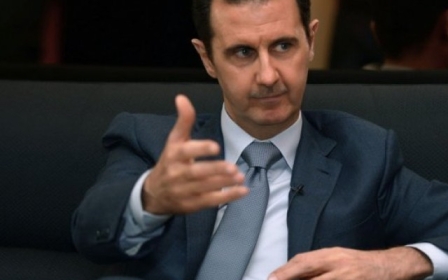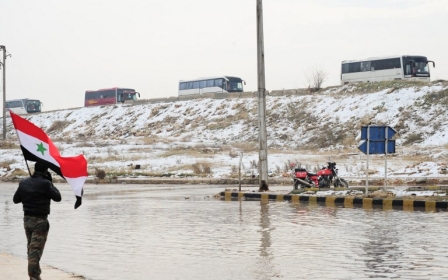Jets strike rebels as Syria army presses assault to secure water source

Syrian government aircraft bombed a rebel-held district that is home to the capital's main water source on Friday, as the rival sides traded blame over a cut to mains supplies, a monitor said.
Government aircraft dropped at least 10 barrel bombs - crude munitions notorious for the indiscriminate casualties they cause - the Britain-based Syrian Observatory for Human Rights said.
The news came as the Syrian army and its allies pressed ahead on Friday with a two-week-long offensive to seize the strategic valley of Wadi Barada, where a key spring provides water supplies to around five million people in the capital, Damascus, residents and rebels said.
Aerial bombing and shelling by the army, as well as by Hezbollah fighters stationed in mountains overlooking the valley on the northwestern edge of the capital, have intensified in the last forty-eight hours, they said.
The Syrian army, aided by Hezbollah, the Iranian-backed Lebanese Shia group, has so far been unsuccessful in making any significant advance in the valley since they launched the drive to capture the strategic area and accused rebels of polluting the springs with diesel.
Scores of jets pounded the area around the Ain al-Fija springs and the villages of Baseimah, Kafr Zayt and al Husseineh, which form part of a cluster of ten villages controlled by rebels in the valley that lies at the northwestern edge of the capital.
The group was formerly known as al-Nusra Front, an al-Qaeda affiliate that remains blacklisted as a terror group by the United Nations and Western governments.
East of the capital, clashes also broke out in the Marj district despite a ceasefire in force since 30 December. Three people were killed, one of them a child.
In Damascus, there were a number of casualties from rebel rocket fire.
The rebel fighters there rejected a government offer to leave the area for the rebel-held province of Idlib in northern Syria. Similar deals have led rebels to yield swathes of territory, including the flashpoint city of Aleppo.
Residents of the area say the rugged nature of the terrain gives the rebels, drawn from both moderate and Islamist factions, a natural advantage in pinning down any advancing troops.
"They cannot advance easily; even if the rebels are outnumbered they can easily strike any advancing troops from the three main entrances into the encircled valley," said Abu Mohammad al Qalamoni, a rebel fighter in contact with fellow fighters inside the valley.
Ceasefire stressed
The military offensive has strained a ceasefire agreement brokered by Russia and Turkey aimed at bringing about Syrian peace talks in Kazakhstan.
Opposition groups have warned that unless the Syrian army halts its attacks it would consider any truce "null and void". They have also suspended any discussion on participating in the forthcoming peace talks unless Russia puts pressure on the government and its Tehran-backed allies to abort the offensive.
On Thursday, Turkey’s foreign minister called on Russia to keep the Syrian government to its pledge of complying with the ceasefire that Moscow and Ankara jointly brokered.
During his New York City visit to meet newly-appointed United Nations Secretary General Antonio Guterres, Mevlut Cavusoglu told reporters he was worried by breaches of the ceasefire, which was endorsed over the weekend by the UN Security Council (UNSC).
“They need to stop the regime and affiliated groups,” Cavusoglu said. “Everybody must keep their word, and show that they stand by the obligations they undertook,” he added.
The foreign minister said all of the violations were committed by the government, adding that Ankara was doing its best to keep opposition fighters from retaliating.
“However, this will be extremely difficult if the other side keeps doing this. We need to recognize this reality,” he said.
Key supply line
Wadi Barada lies on a road from Damascus to the Lebanese border that is a key supply line for Hezbollah, which is heavily involved in fighting alongside the Syrian army.
The rupture of water supplies from the springs has caused severe shortages after the pumping station of Ain al Fija that supplied around 70 percent of the capital's water needs was damaged.
Prices of bottled water and trucked water supplied by private traders to residential homes has tripled, residents of the sprawling capital say, with a black market now thriving.
The government of Syrian President Bashar al Assad has also brought in supplies from other provinces by tanker to cover some of the shortfall in the capital and pumped extra water from underground wells.
The army says it is fighting militants in the area, a claim denied by local fighters.
A military media unit run by Hezbollah said on Thursday at least 11 al Qaeda-linked fighters were either killed or wounded when they were targeted by rockets, but those figures could not be independently confirmed.
The civilian population in the valley is estimated by the United Nations to number around 45,000, but civic groups say the total is double that with their plight worsening daily under heavy shelling and shortages of food and medicine.
Dozens of homes have been hit by the bombing campaign.
Only 1,200 families have so far left to a government-run shelter in the nearby town of Rawda, the UN said.
"We hope in a few days water will return back to the capital after the army takes back Ain al Fija. The army is advancing and ... we expect good news," Alaa Munir Ibrahim, a governor in the Damascus suburbs, told state media.
Middle East Eye propose une couverture et une analyse indépendantes et incomparables du Moyen-Orient, de l’Afrique du Nord et d’autres régions du monde. Pour en savoir plus sur la reprise de ce contenu et les frais qui s’appliquent, veuillez remplir ce formulaire [en anglais]. Pour en savoir plus sur MEE, cliquez ici [en anglais].





